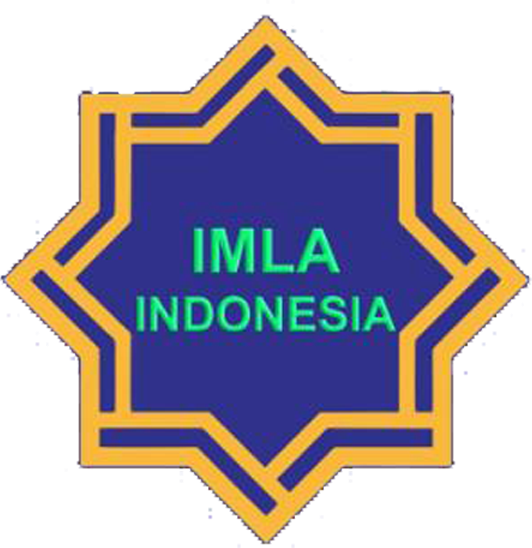The Comparative Study of Students’ Ability in Writing Skill between Salaf’s and Khalaf’s Pesantren/ المقارنة بين كفائة الطلبة على الكتابة في المعهد السلفي والخلفي
Abstract
Arabic is one of the materials studied in Pesantren Khalafi and Salafi. Maharah Kitabah is one of the important skills in learning Arabic. The purpose of this study was to determine the extent of the differences in the kitabah ability of the students in Pesantren Khalafi and Salafi. This study uses a comparative method. Data collection tools used in the form of tests on 50 students of Pesantren Salafi and 50 students Pesantren Khalafi. The data analysis method using by the Mann Whitney statistical test with α= 0,005. The results of this study showed that there was a difference between the maharah kitabah ability of Students in Pesantren Khalafi and Salafi with the statistical value of Arabic writing (p-value (0.016) <α (0.05))
تعتبر اللغة العربية إحد المواد الدراسية التي تدرس في المعهد السلفي والخلفي .واللغة العربية هي الإحدى المهارات اللغوية في تعلم اللغة العربية. بالنسبة إلى هذا فإن هذا البحث يهدف إلى التعرف على المقارنة بين كفائة الطلبة على الكتابة في المعهد السلفي والخلفي. إن منهج البحث الذى اعتمدت عليه الباحثة فى كتابة هذه الرسالة هو المنهج المقارن. ولجمع البيانات تقوم بالاختبارات في 50 عينة من الطلبة في المعهد السلفي و50 عينة من الطلبة في المعهد الخلفي. ويتم اختبار الفرضيات باستخدام Mann Whitney من النظام المحسوب بنتيجة = 0،005 . وقد نالت من هنا نتائج البحث المستنتجة من البحوث أن هناك الإختلاف بين كفائة الطلبة في المعهد السلفي والخلفي في كتابة اللغة العربية (p-value (0.016) <α (0.05))
Keywords
Full Text:
PDF (العربية)References
Fauzan (2017), Urgensi Kurikulum Integrasi Di Pondok Pesantren Dalam Membentuk Manusia Berkualitas. FIKROTUNA: Jurnal Pendidikan dan Manajemen Islam Volume 6, Nomor 2, Desember 2017.
Hastono, S.P. & Sabri, L. (2010). Statistik kesehatan. Jakarta : Rajawali Pers.
Junaedi (2017). Paradigma baru filsafat pendidikan Islam. Jakarta: Kencana.
Kompri (2018). Manajemen dan kepemimpinan pondok pesantren. Jakarta: Prenamedia Group.
Munir (2016). Perencanaan sistem pengajaran bahasa Arab. Jakarta: Kencana.
Muniroh (2010). Problematika maharah al-kitabah di kelas V The Comprehensive Islamic Lab School Pondok Pesantren Wahid Hasyim Gaten Yogyakarta tahun akademik 2009-2010. Yogyakarta: UIN Sunan Kalijaga.
Qomar, M. (2003). Pesantren dari transformasi metodologi menuju demokratisasi institusi. Jakarta: Erlangga.
Rumadi (-). Renungan Santri. Jakarta: Erlangga
Zuchairiny, A. (2013). Penguatan Tradisional: Studi Kasus Model Pembelajaran Kitab Kuning di Pesantren Alkhairaat Madinatul Ilmi Dolo Sulawesi Tengah, ISTIRA’ Jurnal Penelitian Ilmiah, 1 (2)
Herdiansyah, H. (2017). Environmental Awareness to Realizing Green Islamic Boarding School (Eco-Pesantren) In Indonesia. IOP Conf. Series: Earth and Environmental Science, 30 (1)
Luthfi, M. (2014). Pesantren Educatin In Flow Of, Globalization. The 2014 WEI International Academic Conference Proceedings, Bali, Indonesia.
Asrohah, H. (2011). The of Pesanten Responses toward Modernity and Mechanitoward Modernity and Mechanis insm in Organizin Transformation. Jurnal of Indonesian Islam, 5(1)
Bull, R. L. (2010). Madrasa By Any Other Name Pondok, Pesantren, and Islamic Schools in Indonesia and Larger Southeast Asian Region. Journal of Indonesia Islam, 4(1)
Dhofier, Z. (2015). Tradisi pesantren: Studi pandangan hidup kyai dan visinya mengenai masa depan Indonesia. Jakarta: LP3ES.
Zuhriy, M. S. (2011). Budaya pesantren dan pendidikan karakter pada pondok pesantren salaf. Walisongo: Jurnal Penelitian Sosial Keagamaan, 19(2), 287-310.
لافي، سعيد(2015م). تعليم اللغة العربية المعاصرة، القاهرة: عالم الكتب.
طعيمة، رشدى أحمد وعلي أحمد مدكور وإيمان أحمد هريدى (2010م). المرجع في مناهج تعليم اللغة العربية للناطقين بلغات أخرى، القاهرة: دار الفكر العربي.
DOI: http://dx.doi.org/10.17977/um056v5i2p105-121
Refbacks
- There are currently no refbacks.
Copyright (c) 2021 Dara Mubshirah

This work is licensed under a Creative Commons Attribution-NonCommercial 4.0 International License.
AL-ARABI is indexed by:
Editorial Office:
Al-Arabi: Journal of Teaching Arabic as a Foreign Language
Arabic Department, Faculty of Letters, Universitas Negeri Malang (UM)
Jalan Semarang 5, Malang 65145, Indonesia.
Telephone: (0341) 551312 Ext. 239. Fax (0341) 567475.
E-mail: alarabi@um.ac.id

Al-Arabi: Journal of Teaching Arabic as a Foreign Language is licensed under a Creative Commons Attribution 4.0 International License.
Based on a work at http://journal2.um.ac.id/index.php/alarabi/










